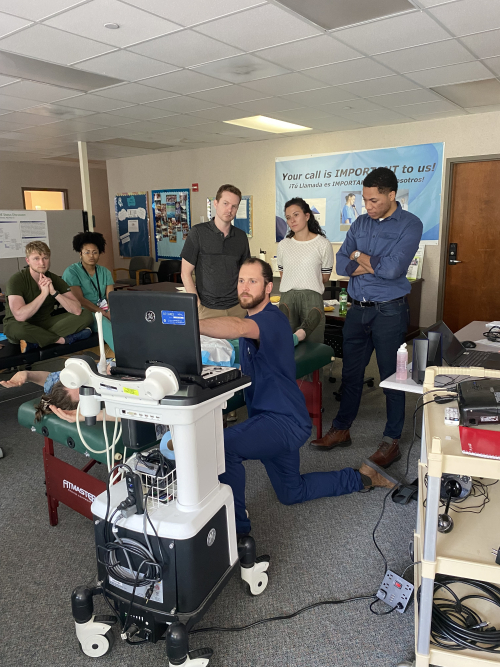

July 19, 2023

Every summer, the NCAFP provides several opportunities across North Carolina to immerse medical students into the world of Family Medicine. For two weeks in June, five students from four different NC medical schools learned the realities and benefits of Family Medicine through the NCAFP’s Rural Immersion Program in partnership with MAHEC Hendersonville: Morgan Maner, Kelsey Rich, Paul Scott, David Murray, and Warren Taylor Wolfe.
These programs lead medical students through two separate periods of close observation of our specialty: one week at the residency program, participating in clinical skills workshops, engaging in didactics, visiting the residency clinics, and generally getting a deeper understanding of the patient populations by spending time in the community; followed by one week spent shadowing a physician in the surrounding area in one-to-one mentorship. The 2023 western cohort completed their externships in West Jefferson, Brevard, Hendersonville, Shelby, and Bakersville. Thanks to all their learning beyond the classroom, the students who participated came to better appreciate how Family Medicine works for rural and underserved communities and hopefully solidified their belief that it is the right specialty for them.
The NCAFP implements these annual summer externships to take medical students out of the classroom and into Family Medicine clinics across the state. Our state’s medical schools already give them top-notch instruction, yet medical students often want experiences to supplement their academic settings. “It was harder to understand the role of Family Medicine in a community when I was doing Clinical Week at UNC,” says Kelsey Rich. “But out here [in Hendersonville], you can see why having family physicians can be so important to a community.”
For all five of the participating students, experiencing that impact for themselves makes them want to become family doctors. According to our post-program data, all reported being more likely to pursue Family Medicine as their specialty of choice. David Murray said, “This experience strengthened my desire to be a family physician.”
But the program also exposed these students to another important choice that’s just as important as specialty: the communities in which they want to practice. All five participants said that they were more likely to practice in a rural community after finishing the program. “It confirmed my impressions of rural health practice as integral to these communities,” said Morgan Maner.
In the clinics where these students shadowed their preceptors, there are more types of patients facing a wider spectrum of health concerns than you might expect in rural NC. Paul Scott said that the patients that visited the clinic ranged in age and background: “The oldest patient we saw was 94 and the youngest was two weeks old,” he said.
Warren Taylor Wolfe said his experience with patients was similar. “The patient population varied,” he said. “They were predominantly older, rural white patients, though there were also a number of middle-aged and Hispanic patients also.” This range of patients means that the students saw their preceptors treat a range of different medical needs, including prenatal care, hospice care, chronic illnesses like hypertension and diabetes, and opioid addiction treatments.
For Kelsey Rich, this variety was crucial to what she learned during her externship. “It really helped to broaden my thinking when medical school curriculum is so singularly organ-systems based,” she said
Wolfe added that the variety put a special part of Family Medicine on display: “It’s the relationships they have been able to build with their patients,” he said. “I really enjoyed seeing the wide range of conditions they could address.”
In completing their evaluations, they all reported that they better understood Family Medicine and its support for underserved patients — that’s why they recommend these externships to any other medical students. They shared specific points on how to make the most of attending:
“Just be ready to have fun and really participate,” said Paul Scott. “I'm glad that during my second week, I got to participate in as many encounters as I could, in order to learn how to be a better medical student on rotations. Also because I just found the patients to be so interesting.”
For Wolfe, shadowing his mentor physician meant seeing their lives outside of their practice. He said that was important also. “I’d encourage future students to take advantage of any opportunities to spend time with their peers,” he said. “They should try to get the answer to the question ‘medicine and...?’ in terms of how people balance their lives outside of medicine.”
Kelsey Rich echoed this advice for personal connections: “Spend time with your host family! I loved them.”
These insights for both professional and personal enjoyment come from having both the clinic-shadowing and host-family elements at the same time. Both of these elements rely on the physicians who gave their time as preceptors, hosts, and mentors. Thank you to all of you who made these Hendersonville externships possible for our students, and particularly to our hosts and preceptors:
The North Carolina Academy of Family Physicians, Inc. (NCAFP) is a nonprofit professional association headquartered in Raleigh which represents over 4,300 family physicians, family medicine residents, and medical students across the state. It is the largest medical specialty association in North Carolina and is a constituent chapter of the American Academy of Family Physicians, based in Leadwood, KS.